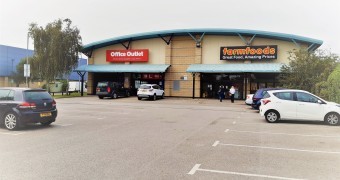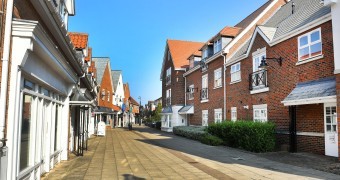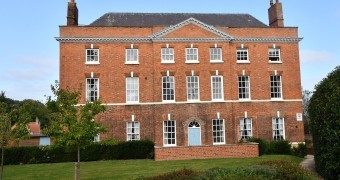What’s the difference between freehold and leasehold property?
When you invest in commercial property in the UK, you will encounter two terms to describe the legal ownership of properties: freehold and leasehold. It’s vital you understand the difference between the two as it will have a significant impact on your investment, your ongoing costs and the obligations you must meet.
In this guide, we discuss the key differences between leasehold and freehold properties and the implications for your commercial property investment.
What is freehold commercial property ownership?
If you buy commercial property on a freehold basis, you own all the property, including the land itself and any buildings and structures on it. That ownership is not limited by time, so the property and the land are yours until you decide to sell it or pass it on.
What is leasehold commercial property ownership?
In a leasehold ownership structure, you own the property for a set period of time (according to the terms of your lease) but not the land the property is on. Someone else (your landlord) owns the freehold.
As the leaseholder, you are subject to terms entered into between yourself and the freehold owner. The lease will run out at some point (although you may be able to extend it), and when it does, ownership of the property returns to the freeholder.
It’s primarily residential flats that are owned on a leasehold basis, although this type of ownership structure also applies to some commercial properties. Leaseholders can ask to buy the freehold of a property at any time. However, their landlord is under no obligation to sell.
Commercial property management
Our commercial property managers provide a range of services for investors, occupiers, and property portfolios across the UK. Contact our team to find out how we can assist today.
The difference between long leaseholds and short leaseholds
Owning a commercial property on a leasehold basis is often confused with a short-term lease, but the two are very different.
Leasing a commercial property, known as a short leasehold, is when you rent a premises for a few years. For example, you might sign a three-year lease on a retail outlet or an office space. In this case, you never actually own the property. You simply pay the landlord a monthly rent for use of the space.
A long leasehold is very different. In this case, you buy the property with a single upfront payment, just as you would with a freehold property, and many buyers will require a commercial property mortgage. You must also pay Stamp Duty Land Tax on the purchase, although the rates on commercial freehold and leasehold properties differ.
Long leases can run for a very long time, up to 999 years, and are often granted when a larger building is split into multiple commercial units. The lease places certain restrictions on how you use the part you own, such as an obligation to keep the building in good repair or not to make excessive noise.
How do maintenance fees and services differ?
Ground rent is the annual payment made to the landlord, or freeholder who owns the property. When searching for a commercial property, we recommend confirming details of the ground rent before signing agreements. Ground rent can be paid at either a fixed, or escalating rate- which means it could increase after the first year.
With a leasehold property, you won’t have to pay annual ground rent if you are a freehold owner. You will have to be responsible for maintaining the fabric of the building, including the roof and the outside walls. If you are a leaseholder, then you are not responsible for maintaining and running the building. Usually, the landlord will appoint a managing agent to do this for them. If there are any major works that the leaseholder would like completed to the property, then they will need to obtain permission from the freehold owner. In some cases, leaseholders share the costs of paying a service charge to the landlord where you will be asked to pay a sinking fund to cover any unexpected maintenance work.
Can I get a mortgage on a commercial leasehold property?
Yes. Typically you can get a commercial mortgage on a leasehold property that has at least 40 years to run on the lease. Importantly with long leaseholds, you usually have the right to extend the lease, with the cost based on a defined formula. That gives you some reassurance about the longevity of your investment.
How do maintenance fees and service charges differ?
If you buy a commercial property on a leasehold basis, you will usually have to pay ground rent to the landlord or freeholder annually. It can be paid at either a fixed or escalating rate so it could increase after the first year. When considering a leasehold commercial property, always confirm the details of the ground rent before you commit.
As a leaseholder, you are not responsible for maintaining and running the building. That is usually done by a managing agent appointed by your landlord. However, you may have to pay a service charge to the landlord to cover the cost of the works according to the terms of your lease. If you want to make major changes to the property, you must seek the freeholder’s permission first.
If you buy the freehold of a commercial property, you are solely responsible for maintaining the fabric of the building, including the roof and the outside walls. That could bring significant costs. However, you can make changes to the building as you see fit (as long as you have the relevant planning and usage permissions).
Disputes between freeholders and leaseholders
Both leaseholders and freeholders have rights that protect them in the event of a dispute. The most common source of contention between the two parties relates to fees. Leaseholders can feel that the freeholder is overcharging them or not doing enough to maintain the building, while freeholders frequently complain that leaseholders are breaching the terms of their lease.
How to choose your commercial property ownership type
When looking for a commercial property, you must understand the difference between leasehold and freeholder ownership and the obligations it brings. Consider your options financially and legally and consult a professional to understand which type of ownership best suits your circumstances and requirements.
Whatever type of commercial property you’re looking for, we can help you find it and advise you throughout the process so you can make an informed decision. Find out more about our commercial property agents and get in touch to discuss your requirements with our team.
Experts in commercial property
Contact our team of leading auctioneers, property agents, and RICS-qualified surveyors today.












